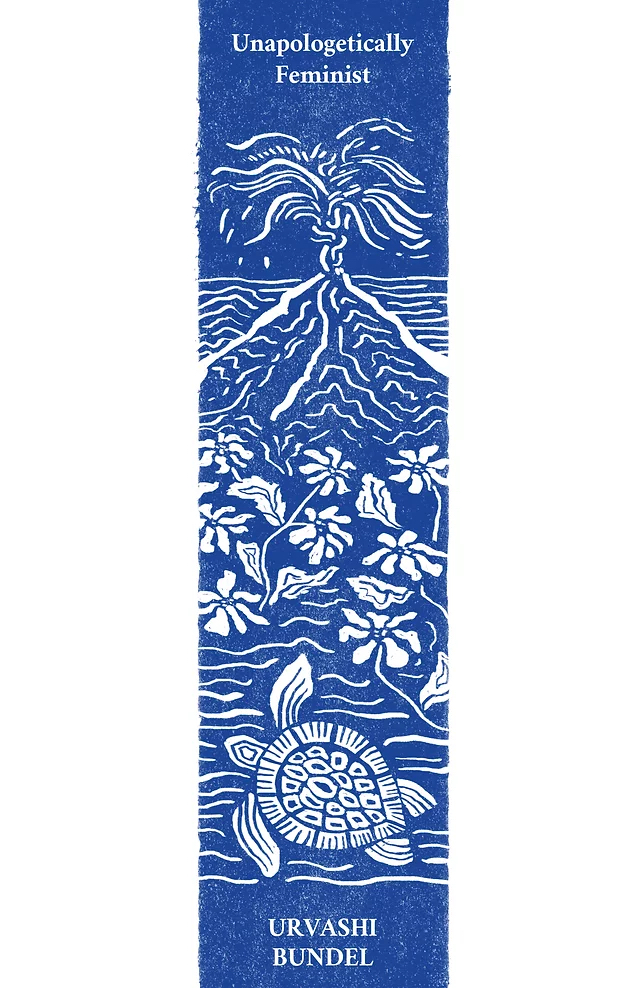Published May 30th, 2022
Review
by Dolores Hunsky
Unapologetically Feminist (2022) is an eye-opening poetry collection that deals with many of the social injustices that still plague our world and it sparks the necessity to speak up in anyone brave enough to read it and be willing to act upon it. Urvashi Bundel, the author of this remarkable social critique in verses, will have even the most impartial of us questioning whether we are doing enough, both socially and politically, and how we can improve even further. The issues addressed involve all of us, beyond differences of gender, race, and class, and it is essential that we finally stop neglecting them and take action. The promises of social justice contained in this marvelous collection cannot wait.
The poetry collection Unapologetically Feminist by Urvashi Bundel is bound to inspire anyone who dares to read it. This incredible poet, law specialist, social entrepreneur and humanitarian is not afraid to speak from her heart, regardless of how direct and relentless her words may be. The addressed topics are in one way or another connected to feminism, equal opportunities, and different shapes and forms of activism. One cannot remain untouched by Bundel’s work, nor will they be able to ignore the passion that burns between the lines of these poems. Cultural references are combined with vivid imagery and compelling arguments, which support the fierce tone of verses, as they encourage rebellion and condemn pacifism.
The proclaimed “powerhouse collection” is indeed an enthralling and unsparing read. Divided into three sections: “World of Fire,” “Watch Me Burn,” and “From the Ashes”; the reader boards onto an emotional journey that demands to be seen, heard, and felt. Sparing no sentiment and refusing to apologize, the poetry forces us to acknowledge some of our strongest emotions: fear, anger, and disappointment. Evidently, social critique, failure of humanity, and desperate call to action are the main messages behind the carefully crafted stanzas that challenge one’s thoughts and question their past — as well as future — actions. Bundel knows exactly how she feels and she is not afraid of letting the whole world know that it has let her down. In those feelings, she is not alone; numerous individuals, especially women, share her rage and dissatisfaction — both of which their society needs, if a change is to occur.

Unapologetically Feminist is a travelogue through various cultures, while it showcases a palette of feelings and contains numerous cries for action. When picking up this book, there is no mercy. It is not an easy read if one is not willing to listen, learn, and act. Personally, I like to take my time when reading poetry, but here I found myself excitedly nodding to the stanzas, being thankful someone has had the courage to send these words into the world, and hurrying on with my reading. The extensive cultural references only prove how sophisticated, well-travelled and meticulous Bundel is. Ranging from Srebrenica to Zanzibar, Cinderella to Cleopatra, the witch trials to the war in Afghanistan — it can be quite difficult to fully grasp the meaning and magnitude of the poetry without extensive cultural knowledge or the willingness to acquire it. The understanding of how deep the sentiment and its message actually go is crucial. The lyric subject “returns burned again from the bushes, / This time with the title of witch.” She tells the story of a woman, who “as her tears profusely rolled down her cheeks,” plead her “not to tell her nieces / why she never found a man.” Towards the end of the collection, not only the author, but also the reader slowly starts to understand “why Maya Angelou’s | Caged bird | Sings.”
It does not stop with the references — the imagery that is conveyed is delicately chosen and thoroughly precise. Almost as a surgical wound, the verses cut into the subconscious of both the oppressed and the oppressors. As Bundel puts it: “We couldn’t even tell the colour of their blood, / Yet we divided them into flags and heritage.” A few poems later, on page 25, her disappointment strikes even deeper in the poem “Between the Ashes”:
Either your fire’s too holy or mine too unsophisticated
To see no difference
Between the ashes you create!
Disobedience and truth are viewed as the ultimate salvation and only hope – the defiance is the “elixir” that leads us to the “marvellous instance” of “questioning the fundamentals of happiness / And the corporate ladder it is all built on.”
Failure and defeat encompass all aspects of feminism, even the ones that society is quick to neglect. Taking the title into consideration, inclusion of themes, such as sexism, patriarchy, misogyny, rape, and gender binary are expected; however, the author went much further than the basics. Including racism, poverty, mental health, and much more, the poems pack a strong, persuasive punch and deliver a knockout to anyone who wishes to argue about how progressive and fair today’s society is. As if that wasn’t enough weight for 200 pages to carry, the critique extends to the digital world and current pace of life; more specifically the “delusional” artists that rush their creations only to post them on social media. Bundel wonders what kind of creativity “doesn’t know how to pause?”
Not to underplay,
But either you’re so flooded
With creative juices
That you can release one “inspirational quote”
Each day
Or you don’t care whether it is
Inspirational at all.
The confident and even fierce tone of the collection leaves no room for pacifism and bystanders. The author mocks and shames those that choose to be silent:
I promise no harm shall befall you.
It’s the safest spot on Earth,
Albeit a bit crowded –
The spot of a bystander!
Education, love, and patience are given the respect and significance they are long overdue and it seems as a fresh breeze can be felt in Bundel’s words. The breeze, naturally, has the potential to turn into the storm and with each turning page, the reader is encouraged to make a change, to become more pro-active, and to fight for what is right. Additionally, the distinction between tradition and legacy is addressed, as well as the distinction between patriotism and nationalism. The way the author gives us hope with words “It’s good to be a woman” and then breaks our hearts by continuing: “In some countries,” pretty much sums up the dynamic of Unapologetically Feminist.

Bundel uses her poetry to vehemently claim what is rightfully hers and she does it with uttermost determination and self-belief. She is proud of who she is and she knows that “desperate times cry for desperate actions” or, better yet, for creative ones.
I am not trying to be different.
I am different.
It is your problem that you can’t see
Beyond my color,
Race, creed, and sex,
Language, fingers, and toes.
You must get creative.
Her work is beautifully provocative and will make the reader think twice, even if they only skim through the titles, which include: “Child Brides,” “A Girl Who Reads,” “Womanned Up!,” “Afghanistan: A Twenty-Year-Long Jest.” Unapologetically Feminist will affect even the most apathetic of readers, as it makes them realize that maybe we all lack “a queer woman’s heroism.” Because “The world isn’t looking for one more martyr,” since “one size fits all: woman!” Although one might need some time to digest the reading, this is just the food for thought that we need as a society. It is exactly this kind of art that inspires change and encourages improvement. None of us can keep running and hiding; instead, we must fight and do better. It is necessary we do better.
We must dare to be Unapologetically Feminist.
Nationality: Slovenian
First Language(s): Slovenian
Second Language(s):
Croatian,
English,
German
Supported by:


Comments on "(Up)Rising Necessity — A Review of "Unapologetically Feminist" by Urvashi Bundel"
Please log in to submit a comment.
Login